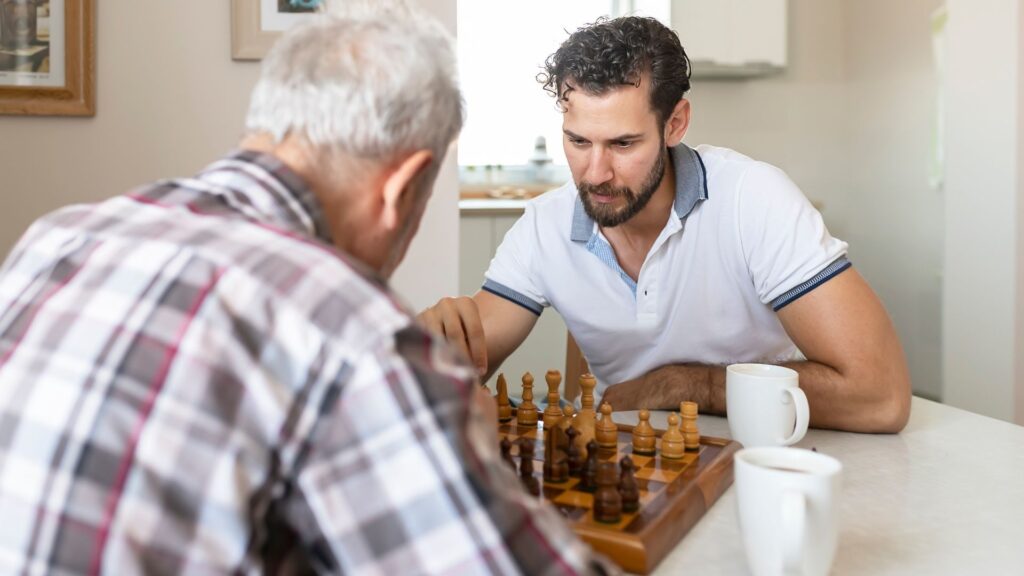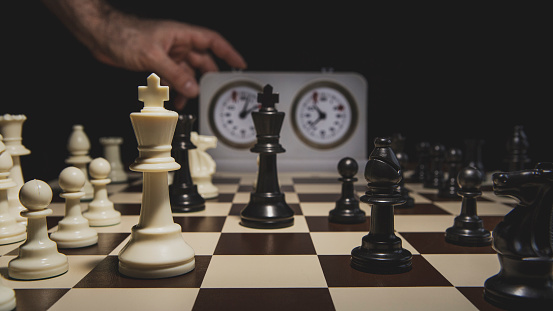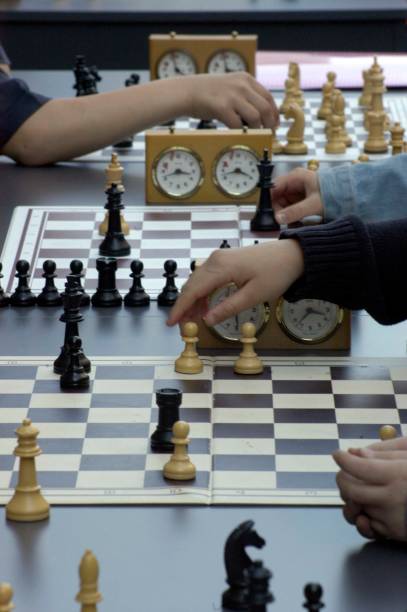How long is your chess game going to last? This is a question I get asked a lot by my wife. The answer, however, is not as straightforward as she would like because there are many factors that can influence how long it takes to finish a chess game.
Chess games can last anywhere from a few minutes to many hours. However, casual games typically last less than an hour. A chess game doesn’t end until a player either checkmates’ their opponent’s king, forces a draw, or the other player forfeits the game.
It’s no secret that chess is a complex game with a lot of strategic potentials. But how long do chess games actually last? And why do they take so long to play? In this blog post, we’ll take a closer look at the average length of chess games and some of the factors that influence their duration. We’ll also provide some tips on how to speed up your own gameplay. So let’s get started!

Contents
The object of chess.
Chess is a board game that has been around for centuries. The object of the game is to capture the opponent’s king, and the game can be won in a number of different ways. Although chess may seem like a simple game, it is actually quite complex, and there are many strategies that can be used to win.
In addition to being able to think ahead, good chess players must also be able to execute tactics accurately. Chess is not only an enjoyable pastime, but it can also help improve your thinking skills. So if you’re looking for something fun to do that will also help you stay sharp, give chess a try.
Chess is played on a board of 64 squares, with the objective to advance the pieces and leave the opponent’s King with no way out (called Checkmate). Unlike games such as football, volleyball, tennis, basketball, among others, chess does not have the luck factor.
Strategy and tactics are key during the game. The chess player manages the movements and captures the opposing pieces to win the game. There are the white pieces, which always start the game, and the black pieces.
Why a game of chess last so long.

Chess can take a long time to play, but there is a reason for that. Chess games are full of strategy and players must make careful decisions in order to win. There are many pieces on the board and each one has its own purpose.
Chess is a complex game that requires skill and patience. Players must be able to think ahead in order to outsmart their opponents. Although the game can take a while to complete, it is definitely worth the effort.
Those who are skilled at chess know how to control the board and can typically win against any opponent. Chess, the game of wits, has diversified strategical movements with mindful positioning of pieces in order to outwit their opponent.
Each player has to think and choose the best move and this process takes a lot of time and skill to select the best possible move. Since it’s a game of reasoning and not intuition, players tend to play slow and methodically to make well-thought-out moves that are logical and complex.
It is possible that a player can spend an hour without deciding on their next move. The time spent speculating about moving their pieces is the primary reason chess lasts so long.
To speed up tournament play the FIDE main matches use a standard cadence of 90 minutes each for the first 40 moves with an additional 30 minutes after the 40th move. Based on this pace the match should finish in roughly six hours.
The Type of Chess Game Impacts on the Length of the Game
During the existence of chess, it has undergone several transformations, adaptations, and changes in its rules. There are many ways to play chess that impact the length of the game, including speed games, blind games, and online games.
Let’s have a look at a few variants to know how the type of chess game we choose impacts the length of the game.
Speed Games:
The games of chess can be divided into three categories: slow, speed, and wild. Speed games are the most exciting and challenging form of chess. In a speed game, players have a very limited time to make each move, typically about five minutes.
This forces players to make quick decisions and take risks. As a result, speed games are often more unpredictable than other forms of chess. If you’re looking for an exciting and challenging game of chess, give a speed game a try. Here are some of the most popular speed chess games to try:
Bullet Chess–One-minute matches for each opponent.
This system is widely used today on the Internet and is for two players to have fun without thinking too much.
Blitz or lightening Chess–5-minute matches for each opponent.
Young people really like to play this rhythm. With 5 minutes, you can play chess with enough quality. Examples of this are the rapids tournaments among the best in the world, in which the matches are later published and some of them are of great technical quality.
Semi-Quick Chess–30-minute match for each opponent.
Blind Games: 25-minutes for each player and 20 seconds added more in the remaining time before every move
In blind chess, the players announce their moves in algebraic language, but they do not have a board, they have the board mastered in their own brain. In a quick explanation, if, for example, the a1 square is black, what color will the a2 square be? White, obviously. This is the basic reasoning that will lead a person of absolutely normal intelligence to master all the squares on the board.
Online Chess Games: several rhythms of chess to play with online clocks
Online Chess games are interesting because they are in many rhythms and the time of each depends on the rhythm selected to play. It can vary from 1 minute to several hours. This is where I play most of my chess matches, especially after Covid-19.
What is the Longest Chess Game in History?
The longest game in the official history of a FIDE (International Chess Federation) chess tournament was in 1989, at the FIDE World Championship, held in Belgrade, in what is now Serbia.
The match was Fressinet-Kosteniuk against Villandry Korchnoi who won in 237 moves. The last 116 moves were a battle between a rook and Kosteniuk’s bishop. After 20 hours and 15 minutes of play, the judges decide for a technical draw of the game.
Despite the game ending in a draw, Korchnoi won the tournament by points accumulated in other games, which caused a lot of discussions, which to this day is questioned in the chess world.

What is the Average Length of a Chess Game?
If it is not against the clock, there is no specified time. In the games of tournaments and official competitions, the time allowed is established in a mandatory way.
There are three game rhythms: blitz, fast and classic. The rules of the games are basically the same, however, the time each player has to move pieces changes substantially.
In rapid chess competitions, players have 15 minutes +10 seconds (extra time) for each move. This is not for the total of the game; it is the time that each player has to think.
In classical chess, you have 90 minutes for the first 40 moves followed by 30 minutes for the rest of the game with an addition of 30 seconds per move from move one.
The life of blitz chess or blitz chess is very short. They are played at a rate of 3 minutes and +2 seconds (overtime) for each move.
However, the average length of the chess is 25- 40 moves which translate to about an hour for casual players. But there are different time formats depending upon the game rhythms, therefore, time is not exactly the factor for the average length of chess rather, moves are the determinant for the average length of chess.
We can conclude that time is unnecessary to play a game of chess, as it only serves to define the type of chess competition that will be held.
How to Get Better at Playing Chess:
Anyone can learn how to play chess. In fact, it’s a great game for children to learn because it teaches them how to think ahead and plan strategically. The goal of every serious chess player is to improve his game and there are several factors a chess player can focus on to improve their skills:
- Practice as much as you can
The ability to practice tactics and strategy against real-life players is invaluable to a growing chess player. Playing against other players allows an individual to analyze specific situations, allowing him to build the knowledge base of chess games.
As each player has their own style of play, playing against different players allows more exposure to different situations. You can also download a chess app and play against a computer. Some online programs also have puzzles.
2. Join a Chess club
Normally, in each city, there is more than one club and in medium-sized towns, there is usually always a club. Keep in mind that there will be players of all ages and all levels, surely you will find similar to your level and you can improve the level together. Always, playing with better players than you will make you improve much more than playing with lower-level players.
3. Develop an effective strategy
Chess requires a certain amount of strategy; each player has a different style of play. That said, you should aim to develop a strategy that will improve your game. Understanding each chess game as a separate entity will allow you to develop a strategy before, during, and towards the end of your game.
4. Improve your tactics
Certain tactics, or move sets, are viable in many chess games. Using these tactics is more complicated than just learning their anatomy. Aim to hide the tactic or make your opponent fall for it. Developing your own tactics can eliminate the need for deception; if your opponent has never seen the tactic, they can’t see it coming.
Many tactics exercises repeat their patterns in several games, learning some more typical ones, they can serve you in certain positions and will lead you to victory.
